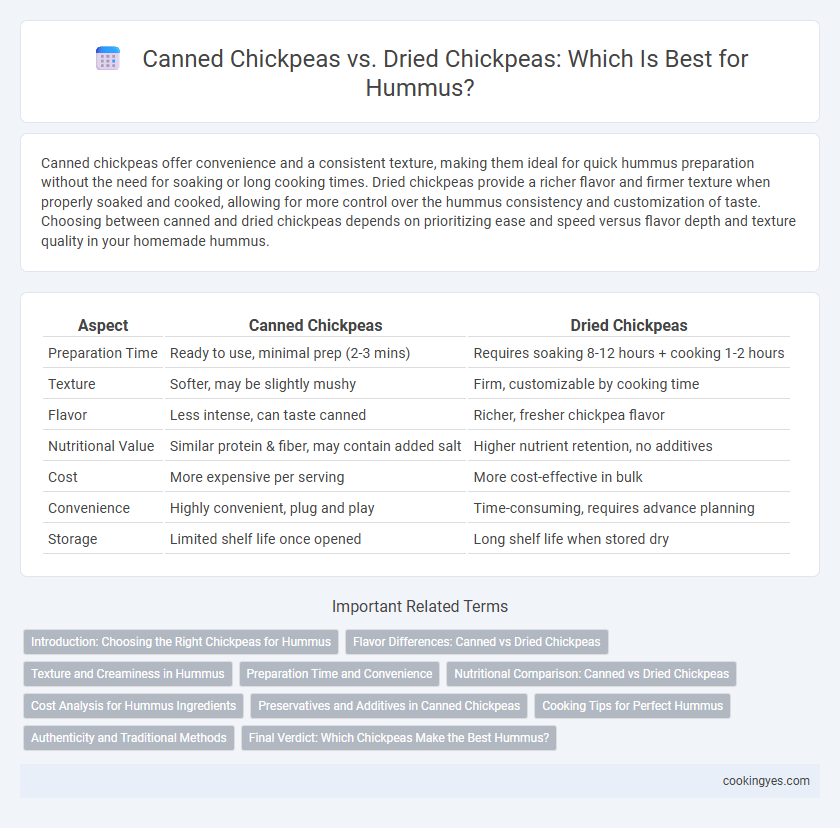Canned chickpeas offer convenience and a consistent texture, making them ideal for quick hummus preparation without the need for soaking or long cooking times. Dried chickpeas provide a richer flavor and firmer texture when properly soaked and cooked, allowing for more control over the hummus consistency and customization of taste. Choosing between canned and dried chickpeas depends on prioritizing ease and speed versus flavor depth and texture quality in your homemade hummus.
Table of Comparison
| Aspect | Canned Chickpeas | Dried Chickpeas |
|---|---|---|
| Preparation Time | Ready to use, minimal prep (2-3 mins) | Requires soaking 8-12 hours + cooking 1-2 hours |
| Texture | Softer, may be slightly mushy | Firm, customizable by cooking time |
| Flavor | Less intense, can taste canned | Richer, fresher chickpea flavor |
| Nutritional Value | Similar protein & fiber, may contain added salt | Higher nutrient retention, no additives |
| Cost | More expensive per serving | More cost-effective in bulk |
| Convenience | Highly convenient, plug and play | Time-consuming, requires advance planning |
| Storage | Limited shelf life once opened | Long shelf life when stored dry |
Introduction: Choosing the Right Chickpeas for Hummus
Selecting the right chickpeas is crucial for authentic hummus, with canned chickpeas offering convenience and consistent texture, while dried chickpeas provide a richer flavor and better control over cooking. Dried chickpeas require soaking and longer cooking times but yield a creamier hummus due to their fresher texture. Canned chickpeas, often pre-cooked with additives, may slightly alter the taste and texture but save significant preparation time.
Flavor Differences: Canned vs Dried Chickpeas
Canned chickpeas offer convenience but often have a softer texture and milder flavor due to preservation and added sodium, which can slightly dilute the earthiness in hummus. Dried chickpeas, when soaked and cooked properly, provide a richer, nuttier taste and firmer texture that enhances the authentic flavor profile of homemade hummus. The choice between canned and dried chickpeas directly impacts the hummus's depth, with dried chickpeas preferred by purists seeking a more robust and traditional taste.
Texture and Creaminess in Hummus
Canned chickpeas offer a softer texture and more consistent creaminess in hummus due to their pre-cooked nature, making them ideal for quick preparation. Dried chickpeas, when soaked and cooked properly, provide a firmer texture that can yield a richer, more authentic creaminess after blending. The choice between canned and dried chickpeas significantly impacts the hummus's mouthfeel and smoothness, with dried chickpeas offering greater control over final texture through cooking time.
Preparation Time and Convenience
Canned chickpeas offer significant convenience and reduce preparation time for hummus, as they are pre-cooked and ready to use, eliminating the need for soaking and boiling. Dried chickpeas require an extended soaking period of 8-12 hours and subsequent cooking for 1-2 hours, making them less time-efficient but allowing for more control over texture and flavor. Choosing canned chickpeas simplifies the process for quick hummus preparation, while dried chickpeas are preferred for customized consistency and freshness.
Nutritional Comparison: Canned vs Dried Chickpeas
Canned chickpeas contain slightly fewer nutrients than dried chickpeas due to the canning process, which can lead to some loss of vitamins like B vitamins and antioxidants. Dried chickpeas tend to have higher protein levels and more dietary fiber per serving compared to canned varieties, enhancing the nutritional profile of homemade hummus. Sodium content is significantly higher in canned chickpeas, making dried chickpeas a better choice for low-sodium diets and overall health optimization.
Cost Analysis for Hummus Ingredients
Canned chickpeas typically cost around $1.00 to $1.50 per 15-ounce can, offering convenience at a slightly higher price compared to dried chickpeas, which average $1.50 to $3.00 per pound and require soaking and cooking. A pound of dried chickpeas yields about 3 cups cooked, making them more cost-effective for large batches of hummus despite increased preparation time. Considering ingredient cost alone, dried chickpeas provide better value per serving, especially for frequent hummus preparation.
Preservatives and Additives in Canned Chickpeas
Canned chickpeas often contain preservatives and additives such as salt, calcium chloride, and disodium EDTA to enhance shelf life and maintain texture, which can alter the natural flavor of hummus. In contrast, dried chickpeas are free from these chemicals, allowing for a pure, uncontaminated base with greater control over seasoning and texture during preparation. Choosing dried chickpeas supports a more natural and preservative-free hummus, appealing to health-conscious consumers.
Cooking Tips for Perfect Hummus
Soaking dried chickpeas overnight and simmering them until tender produces creamier hummus compared to canned chickpeas. Incorporate baking soda during soaking or cooking to soften chickpeas quickly and achieve a smoother texture. For canned chickpeas, rinsing thoroughly and simmering briefly enhances flavor and reduces sodium content, resulting in a more balanced and rich hummus.
Authenticity and Traditional Methods
Dried chickpeas are preferred in traditional hummus recipes for their superior texture and flavor achieved through soaking and slow cooking, enhancing authenticity in Middle Eastern cuisine. Canned chickpeas offer convenience and consistent quality but often yield a softer, less textured hummus, lacking the depth of flavor from fresh preparation. Using dried chickpeas preserves cultural cooking methods and provides the ideal base for classic hummus with rich, creamy consistency.
Final Verdict: Which Chickpeas Make the Best Hummus?
Dried chickpeas yield a creamier, more authentic hummus texture due to their firmer skin and ability to absorb flavors better after soaking and cooking. Canned chickpeas offer convenience and consistent results but may produce slightly less smooth hummus because of added preservatives and softer skins. For the best hummus, prioritizing dried chickpeas enhances flavor depth and texture, while canned chickpeas serve well for quick preparation without compromising quality significantly.
Canned Chickpeas vs Dried Chickpeas for Hummus Infographic

 cookingyes.com
cookingyes.com